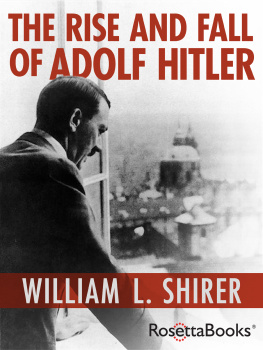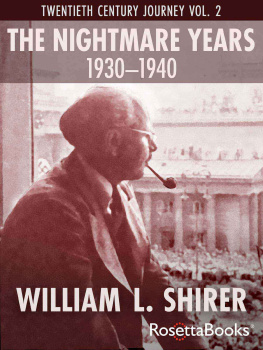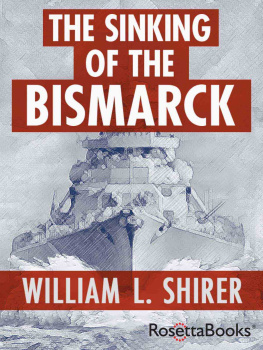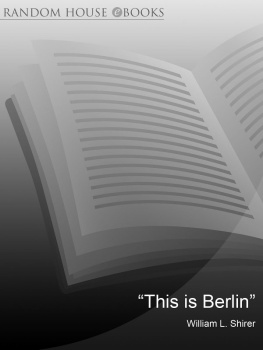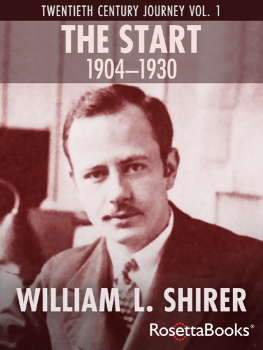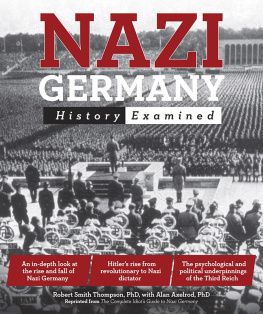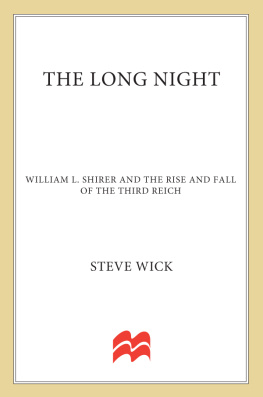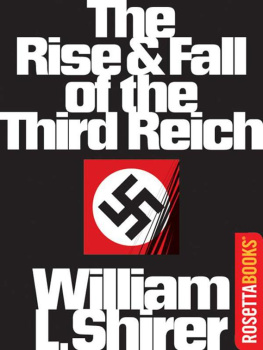The Rise and Fall of Adolf Hitler
William L. Shirer
Copyright
The Rise and Fall of Adolf Hitler
Copyright 1961, renewed 1989 by William L. Shirer
Cover art to the electronic edition copyright 2012 by RosettaBooks, LLC.
All rights reserved. No part of this book may be used or reproduced in any form or by any electronic or mechanical means, including information storage and retrieval systems, without permission in writing from the publisher, except by a reviewer who may quote brief passages in a review.
Electronic edition published 2012 by RosettaBooks, LLC, New York.
ISBN e-Pub edition: 9780795326134
PART 1
THE
RISE OF
ADOLF
HITLER
Father and Son
One day when Adolf Hitler was only eleven years old he got into a violent quarrel with his father. The stern and stubborn parent was a retired customs official in Austria. He insisted that his son follow in his footsteps when he grew up. But the boy had already made up his mind that he wanted to be an artist. His father, he later recounted, was struck speechless at such an idea.
Artist! exclaimed the father. No! Never as long as I live!
Angry words flamed up between them. But the youth would not give in. He refused even to consider becoming a government official. The very idea of sitting in an office filling out forms, he said, made him sick to his stomach. He was determined to become a painter.
Hitler never became a painter, though he considered himself to be an artist to the end of his life. But this determined stand against his father at a time when he was only a boy in the sixth grade at school revealed a fierce, unbending will that was to carry him far in this world.
In fact, combined with other qualities, it carried him to a point where he became the dictator of Germany and then the conqueror of most of Europe. As a conqueror he belongs in history with Alexander the Great, Julius Caesar and Napoleon Bonaparte.
Like them he was undoubtedly a genius. But it must be added at once that he was an evil genius, one of the cruelest, most bloodthirsty and barbarous tyrants who ever lived. Perhaps it would be more accurate historically to say that Hitler was closer to Genghis Khan, the ruthless Asiatic conqueror, than to Alexander, Caesar and Napoleon.
Absolute power corrupted him, as it does all who hold it. Before he died at the age of fifty-six he had massacred millions of innocent persons, including some five million Jews. And he had plunged the world into the bloodiest and most destructive war in history.
We know much more about Hitler than we shall ever know about such illustrious predecessors of his as Alexander, Caesar, Napoleon and Genghis Khan. For one thing, he was a child of our time. Millions of persons still living remember him. Many of them suffered from his barbarous acts. For many years my own job, as an American correspondent in Berlin, gave me the opportunity to meet him, to listen to his numerous speeches and to observe him at first hand at the moment of his greatest triumphs.
Furthermore, at the end of World War II in 1945, the victorious Allies captured most of his secret papers. They were found in abandoned mines and in cellars of old castles where they had been hidden by the Germans. We can thus tear away the curtain that for so long hid his odious acts.
We can read his confidential letters. We can follow his secret talks to his generals and see him plotting war and conquest. We can watch him browbeating his victims, double-crossing his friends and enemies, ordering the murder of his opponents and the massacre of the millions he disliked.
Never before in history has there been such a well-documented story as this one. There is no need to invent or to imagine anything, as chroniclers of the lives of great men who lived in the distant past sometimes have done. What is set down in this book is based almost entirely on Hitlers own records, or on what the author saw in Germany with his own eyes.
The story of the life of Adolf Hitler both fascinates and repels one. He rose literally from the gutter to become the greatest conqueror of the twentieth century. He overcame incredible obstacles in his rise to power. What he did with his powerhow he abused itwe shall see.
School Days and an Interlude of Loafing
Adolf Hitler was born April 20, 1889, in a modest inn in the Austrian town of Braunau-on-the-Inn across the border from Germany.
Austria was a part of the Austro-Hungarian Empire, which was ruled by the ancient and autocratic House of Hapsburgs, the oldest ruling family in Europe. This Austro-Hungarian Empire no longer exists. It was destroyed at the end of World War I (which it largely provoked) when the various nationalities that comprised itthe Poles, Czechoslovaks, Hungarians and Yugoslavsbroke away to form their own countries.
But at the time of Hitlers birth, eleven years before the end of the nineteenth century, Austria-Hungary was one of the most important empires in Europe. It sprawled along the Danube River in central and southeastern Europe. It had a large army and navy. It was economically prosperous. It had an extensive aristocracy made up of dukes, archdukes, princes, counts and barons, most of whom lived in beautiful castles or palaces.
The Austrians, though outnumbered by the other nationalities, dominated the empire. They were a branch of the Germanic people and spoke German. Many, like Hitler, thought of themselves as German. This must be kept in mind in tracing the career of the future German dictator. Though born an Austrian, he considered himself to be as good a German as those who lived in Germany. And he thought that all Germans should be united into one countryan objective he ultimately achieved for a short time.
His father, as we have seen, was a stern, short-tempered man. Adolf respected him but did not get along with him. His mother, as he often said later, he loved. She was a gentle, devout woman, devoted to her husband and especially to her children.
Until Adolf came into conflict with his father, he too seems to have been a gentle and devout child. Indeed while attending elementary school at the Benedictine monastery at Lambach he became a choirboy and dreamed of becoming a Catholic priest.
At this school and at others his grades at first were quite good. But he claimed that his quarrels with his father over what he intended to be when he grew up caused him to lose interest in getting good marks. From the sixth grade on they became progressively worse. At the age of sixteen, when he was midway through secondary school, he became so discouraged that he quit school for good.
Forever after he blamed his teachers for his scholastic failure. The majority of them, he wrote later when he had grown up, were somewhat mentally deranged, and quite a few ended their lives as lunatics. To blame others for our failures is a common fault. But Hitler thenand latercarried it to extremes. He was always finding a scapegoat.
One of his teachers, he later admitted, did inspire him in his youth. This was Leopold Poetsch, who taught history at the secondary school. Young Adolf was carried away by his dazzling eloquence.
You cannot imagine, Hitler once exclaimed years afterward, how much I owe to that old man!
Although Adolf was bored by most of the subjects he was forced to take, he developed a passion for history. This was to help him in his ultimate career.
Hitler once described the three years after he quit school as the happiest days of his life. His father had died in the meantime, leaving his mother but a small pension to support herself and her two children, Adolf and a younger sister named Paula.

